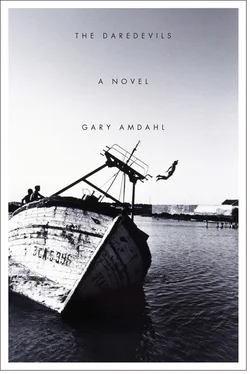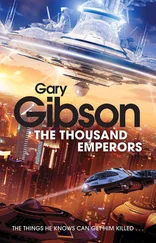Everybody in the hall felt the drop in pressure. Daisy was applauded bravely by a few people in the crowd, but Vera and Charles could see the needle of the barometer moving counterclockwise around the dial. And yet nothing happened.
Charles’s question: Why had nothing happened? He didn’t mean “a dramatic arrest”—he meant “nothing.” The pressure dropped and that was that. Was somebody waiting for somebody else to do something else, something more? Did certain somebodies know less about who all the players were than Charles thought they did? Not likely, but possible. Another slim chance: even dead, Father’s power wasn’t entirely illusory, and he — and by guesswork extension, Daisy — was being handled with kid gloves. And re Father: Why had he not moved to have Charles removed? Was it possible he too had been biding his time — until suddenly he decided his time was up? Did he think Charles might do something politically, actionably, profitably heroic? Or had he — where had he been before he came to rest finally in San Francisco? In New York or London or.? — letting power slip through his fingers like sand? A genuinely good man cannot withstand the vicissitudes that come of power wielded — not forever, he can’t. Hadn’t Father been a genuinely good man? Charles found himself thinking that he had been, whatever that thought might be “worth.”
Perhaps Charles’s removal was underway.
The expected explosion — he paused over the word as it appeared and faded in his brain — over Daisy’s key phrases had failed to occur: was this like an actor forgetting his lines? Or was there a greater script than the actors realized. The force, the gravity, was similar if not identical to the force he felt onstage in ideal circumstances — or even less-than-ideal circumstances. The force he believed he felt. Perhaps in any but the most amateurish circumstances, when the force, if it was present at all, was reversed, repelling all the people and things in the space.
Had he just equated bad acting with detonation, a supersonic exothermic front driving a shock wave through a medium that cannot withstand it?
He had: there was a weird beauty and justice in it, somewhere, somehow. that nevertheless failed to address his certainty that some other kind — or simply degree? — of power was coming into being.
He had felt the supersonic exothermic front driving the shock wave only as one feels the wave of ocean water after it has crashed on the beach, when it is all but spent and about to recede, back into that from which it had come, a tremendous but dying energy — lapsing, paradoxically, not into quiescence or something “lesser,” but into a greater energy. He had felt it twice, the waves each time strong enough to knock him down, but only because another body had taken more of the blow before it reached him, and he was quite sure he understood how it ripped a hole in one kind of reality, exposing another kind of less stable reality; and he had witnessed a far greater force, perhaps the greatest force in the universe, visible, apprehensible, for only as long as it took to cause everything he had before that point assumed to be the only reality to disappear; and he had seen in its wake an apparently equally relentless force recreate, rebuild, make visible once more what had disappeared. He had felt the impalpable, incomprehensible, so-called psychological gravity of two actors acting selflessly on a stage and drawing thereby the concentration of a hundred or two hundred “observers.” But what was happening here, now, was different.
The next stops were Fargo and Moorhead, where nothing — it was preposterous now — other than angry shouting and angry applause in a cold wind under a low, dark, swiftly but barely perceptibly moving sky, like a dark turbulent river, also happened. Small groups of rough-looking men glowered and spat threateningly and told them to get out of town, as if they were in a play. Charles, imagining himself to be a person who could no longer be “troubled” in the ordinary sense, did not think he could be more troubled in the ordinary sense — which was even more troubling in the extraordinary sense he had reserved for himself and Vera. The bomb had exploded on his stage in San Francisco. Now, here, where gunfire was expected to erupt, where he had planned on it, according to a very real sort of script that he had not actually seen but which he believed with all his heart existed, where the explosion of a bomb had to be considered a strong possibility, seeing that improvised violence was the modus operandi everybody had tacitly agreed to, here there was only a group of bad actors in the shadows, representing “consequences” in a way that seemed only sordid, cowardly, contemptible.
Get out of town?
They did. They cut across the state, out of the wheat and into the woods, into Big Timber, to the headwaters of the Mississippi River, where Wobbly strikes had been failing for a decade — failed very much in the way a man might enter a wood, walk strongly and confidently for a while, only to find at the first moment of doubt that he was lost.
The two Wobblies who had in fact gone missing more than a month earlier were still missing.
Several people had told them that Bemidji would be the big stop, that there would be trouble, and someone in Chicago had even gone so far as to counsel against Bemidji, against even getting off the train to stretch their legs. The question was: Who was the someone in Chicago — nominally from the IWW, but did they know that with working certainty? — and was he speaking out of genuine concern for their welfare, or was there worry that the NPL would have some kind of “success” in Bemidji? If so, who did not want NPL success in Bemidji. The MCPS certainly — but how, in this hypothetical scenario, had the MCPS managed to influence the Chicago Wobblies? The Chicago Wobblies were as pure a current as could be, even in the most turbulent stream.
Were they not?
Three telegrams awaited Charles at the Paul Bunyan Hotel.
The first:DISAVOW ANY CONNECTION WITH IWW.
The second:DISAVOW ANY CONNECTION WITH TROUBLEMAKERS CLAIMING ASSOCIATION WITH US.
The third:YOU ARE OPERATING WITHOUT USUAL SANCTION. PLEASE EXPLAIN.
The news that certain “watchdogs of loyalty” had become “junkyard dogs of loyalty” and were embarrassing and compromising the MCPS was of course not news. Disavowal of a relation between the MCPS and the IWW was something else that went without saying, making the saying, of course, profoundly suspicious. And while the whereabouts of the two missing Wobblies remained unknown, “a drifter” had been found dead. His identity and the circumstances of his end were not known. As for the lack of usual sanction: he had it. He had it in writing, in his briefcase, as was usual with sanction. If whoever had telegraphed him was under an impression to the contrary, it could mean one of two things: sanction had been reconsidered and made to disappear, perhaps like the Wobblies but with the additional pretense of “never having existed in the first place,” or the divided house that the MCPS always had been, perforce — how could so many powerful men agree on any notion of safety, public or otherwise? — had become dangerously destabilized.
The women wore dresses with flower prints, anticipating by days or perhaps weeks the actual blooming of spring, the men clean overalls, some with a tie and some without. Charles overheard one man defend his tie by stating the business here was every bit as solemn as the business of a Sunday morning and he would show it a like respect. Some men and women looked about themselves, eager to share their outrage, while some laughed and conversed. A few smoldered, moving awkwardly about with hatred and fear constricting their limbs and faces — lungs, hearts, stomachs too. The same man who’d defended his tie said, “I agree that times are bad, but I don’t care to be told how to do a thing, neither by the railroads nor by the socialists.” A line of men stood at the back of the hall, and Charles could not say if they were embarrassed to be there or had a darker purpose in mind. To his left he felt Vera stiffen; he turned and saw the man he’d seen at the Hillsboro town hall.
Читать дальше












